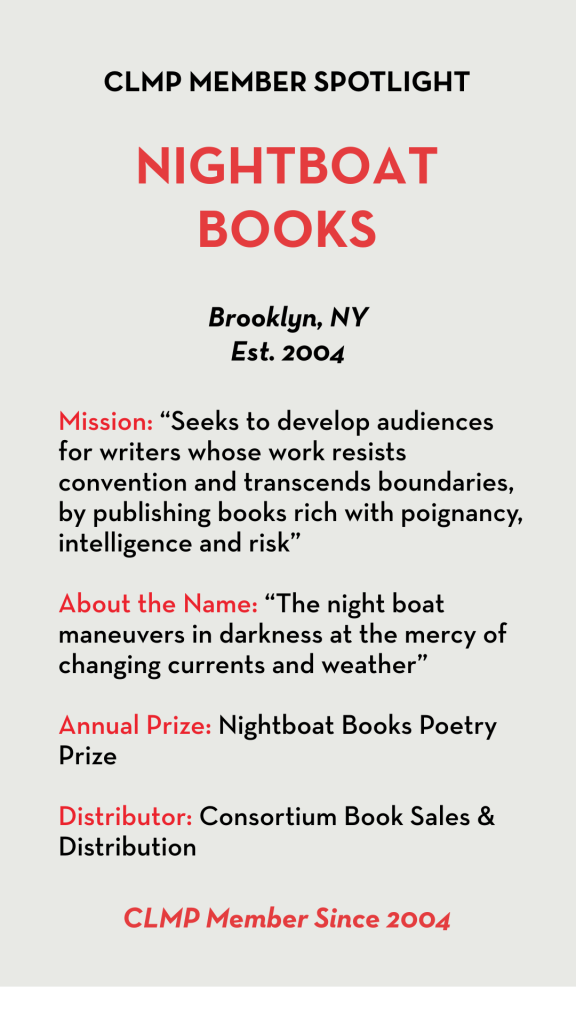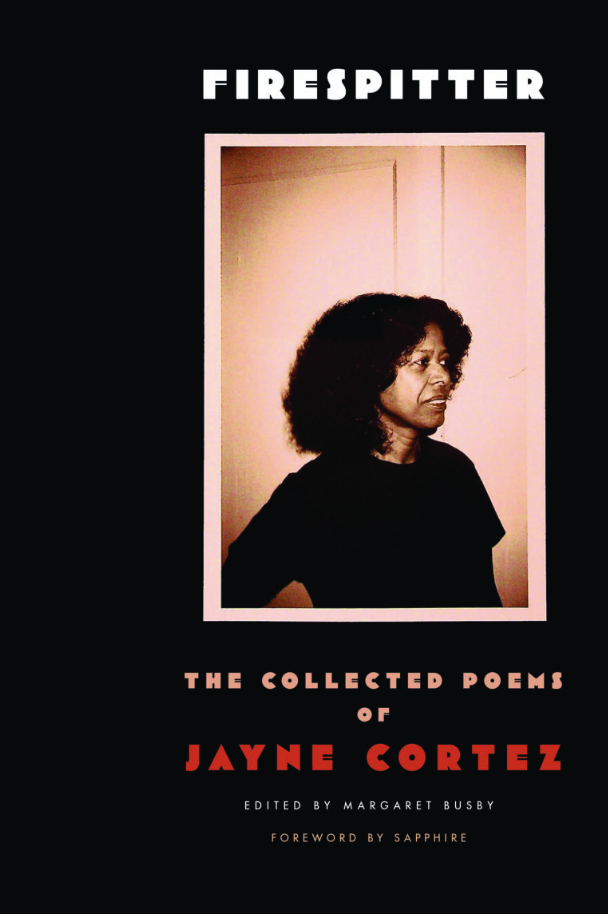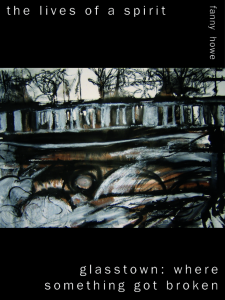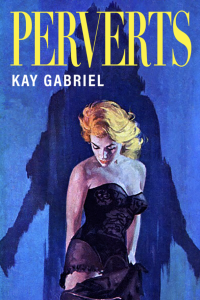We spoke with the staff of Nightboat Books in our latest Member Spotlight.
 What is the history behind Nightboat Books? When was it founded and what is its mission?
What is the history behind Nightboat Books? When was it founded and what is its mission?
Nightboat Books was founded by Kazim Ali and Jennifer Chapis in Beacon, New York, in 2004. The press’s first book, Lives of a Spirit/Glasstown: Where Something Got Broken by Fanny Howe, a beloved writer who died earlier this year, was published in fall 2005, and Ali has recently said that there would be “no Nightboat Books without Fanny Howe.”
Nightboat Books seeks to develop audiences for writers whose work resists convention and transcends boundaries, by publishing books rich with poignancy, intelligence, and risk. In our twenty years of publishing, we have released more than 250 books, including collections of poems, novels and short stories, books of essays, and intergenre writing. Nightboat’s catalog includes books on the AIDS epidemic, artist writing, eco-poetics, queer and trans archives, migration, healing and disability, Black poetics, Asian diasporic experience, and the New Narrative movement.
Can you tell us about some recent or upcoming Nightboat Books titles?
 Firespitter: The Collected Poems of Jayne Cortez is a landmark collection of poems, featuring more than 40 years of poems by the legendary poet, musician, and activist Jayne Cortez (1934-2012). The book, edited by Margaret Busby and with a foreword by Sapphire, collects all the poems Cortez published in her life.
Firespitter: The Collected Poems of Jayne Cortez is a landmark collection of poems, featuring more than 40 years of poems by the legendary poet, musician, and activist Jayne Cortez (1934-2012). The book, edited by Margaret Busby and with a foreword by Sapphire, collects all the poems Cortez published in her life.
Kay Gabriel’s Perverts collages the dreams of her friends and comrades (and some strangers). John Keene calls it an “anti-epic for our current moment.”
Monk Fruit comes from the Palestinian-American poet, activist, and performance artist Edward Salem. The debut collection prowls the edge of prophecy and punch line, like “Rumi on acid.” It’s as intimate as it is acerbic.
Charlie Porter’s Nova Scotia House, published in the UK to rave reviews, is at once a political manifesto, a portal into the (not so distant) past of HIV/AIDS, and a profoundly moving portrait of queerness, grief, and quiet resistance. Hilton Als writes, “There is so much heart and longing in it that fills my soul.” (BUTT writes, “It’s got hookups of every persuasion.”)
We’re also looking forward to bringing out some exciting titles later this fall and winter, including books by Sophia Dahlin, Kevin Killian, Tisa Bryant, and julie ezelle patton.
Nightboat Books has been publishing since 2005. What are some of your hopes and goals for the next twenty years?
 There’s the overarching hope that in 20 years we are living in a world where our authors and community are empowered to make experimental, moving, transgressive work without fear and with material support. Organizationally, we want to continue our program of publishing books across genre and subject, with a deepening focus on queer archival work. We also want to keep uplifting emerging contemporary poets by publishing debut works. We would love to engage with other independent presses in coalition-building and to do more public programming outside of book launches. We’re documenting our editorial process, a bespoke system that we developed over the decades, and refining our ethical framework for Nightboat to use in the coming years. In the far, far future, it would be amazing to have a physical space and public office where people could come visit Nightboat and check out our titles, and where we could host our events. It’s these interactions with our community that really drive and affirm the meaningful work that we do. We plan to continue to increase our artist fees and honoraria, including that of our Editorial Fellowship. Right now we’re focusing on organizational sustainability and capacity-building as we navigate a volatile funding landscape. This work is crucial and we intend to be doing it for a long time.
There’s the overarching hope that in 20 years we are living in a world where our authors and community are empowered to make experimental, moving, transgressive work without fear and with material support. Organizationally, we want to continue our program of publishing books across genre and subject, with a deepening focus on queer archival work. We also want to keep uplifting emerging contemporary poets by publishing debut works. We would love to engage with other independent presses in coalition-building and to do more public programming outside of book launches. We’re documenting our editorial process, a bespoke system that we developed over the decades, and refining our ethical framework for Nightboat to use in the coming years. In the far, far future, it would be amazing to have a physical space and public office where people could come visit Nightboat and check out our titles, and where we could host our events. It’s these interactions with our community that really drive and affirm the meaningful work that we do. We plan to continue to increase our artist fees and honoraria, including that of our Editorial Fellowship. Right now we’re focusing on organizational sustainability and capacity-building as we navigate a volatile funding landscape. This work is crucial and we intend to be doing it for a long time.
What are some other presses, literary journals, and organizations you admire that also publish and support “writers whose work resists convention and transcends boundaries”?
We admire so many presses, but have recently been inspired by the DIY spirit and amazing curatorial work of Spiral Editions, which publishes beautiful objects from really exciting new writers. Their ethos shares many similarities with our mission, and they have really sick merch. We love what LittlePuss Press is doing; similar to Nightboat’s effort to reissue queer and trans classics and to elevate posthumous LGBTQ+ writers whose work was not published in their lifetime, LittlePuss’s catalogue is a wonderful mix of debut authors and archival treasures (and most of the authors are trans, a vital intervention in this time of increased transphobia and suppression of trans people by the state). We’re also following Inpatient Press, focused largely on translation (e.g. Olivia Baes and Emma Ramadan’s new versions of Marguerite Duras’s Six Films) and archival projects, such as a compilation of writings by George and Mike Kuchar, introduced by none other than John Waters. Inpatient has a magnetically irreverent attitude toward publishing—its slogan is literally “We publish what others don’t.”
What distributor is Nightboat Books working with? How can bookstores and libraries find and order your titles?
Nightboat Books is distributed by Consortium Book Sales & Distribution, a division of Ingram Publisher Services, which distributes over 100 independent presses. We moved to Consortium in late 2018, after the closure of the University Press of New England, which had been our primary distributor for the preceding decade. Bookstores and libraries can order books directly from Consortium/Ingram.
Are there any indie bookstores (or libraries) that you think do a particularly good job featuring titles from indie publishers? If so, what do they do?

We appreciate stores in New York City and across the country that post about our books on Instagram, uploads staff reviews on Edelweiss, or feature our books as staff recs. We’re really grateful for the support of Unabridged Books in Chicago; A Room of One’s Own in Madison; Alienated Majesty in Austin, and Good Press in Glasgow, Scotland. Some other classic indies are City Lights in San Francisco, Powell’s in Portland; Literati Bookstore in Ann Arbor; Elliot Bay Books in Seattle; and Skylight Books in Los Angeles.
In New York City, we’re thrilled to have so many strong indie stores, including 192 Books, Books Are Magic, Book Culture, Hive Mind Books, McNally Jackson Books, Molasses Books, Rizzoli Books, Three Lives & Company, Unnameable Books, and The Word Is Change.
Our marketing director’s personal favorite is Stories Books and Cafe in Los Angeles for their selection of chapbooks and experimental prose.
How can interested writers submit their work to Nightboat Books?
Our annual poetry prize is open each fall for submissions of full-length poetry manuscripts. During our prose reading period, which we hold every other summer, we look for experimental novels, essay collections, manifestos, or utopian flights of fancy.
Our staff doesn’t have the capacity to read open submissions year-round, but we are always on the lookout for work that meets the current moment with a rigorous attention to the problems and pleasures of our material world and a prismatic sense of awe.
The best way to get your work noticed is to go out and meet other poets and writers IRL. Go to readings in your town, and if there aren’t any readings, start a reading series, and if there’s no one in your town who cares about writing, start a magazine and invite your friends and favorite poets to submit. The truth is we need more small presses, chapbook publishers, online magazines, and zines—tiny and micro—so, just keep going and find fun people to collaborate with. At the core, that’s what Nightboat is and we want more of it.
